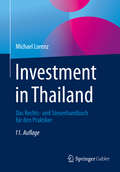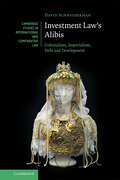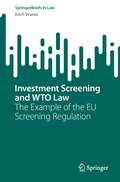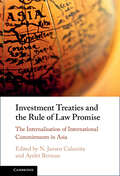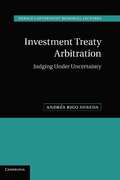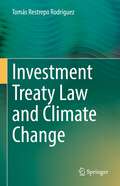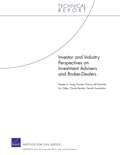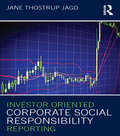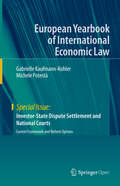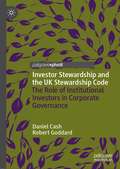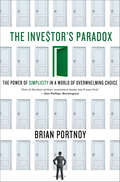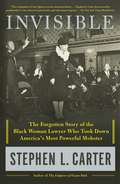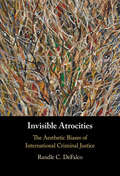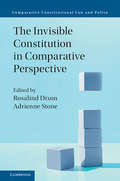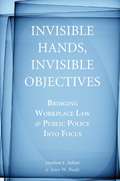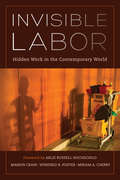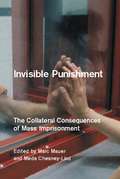- Table View
- List View
Investment Implications of Selected WTO Agreements and the Proposed Multilateral Agreement on Investment
by Matthias VockeA report from the International Monetary Fund.
Investment in China's Health and Care Sector: Opportunities and Possibilities for Foreign Investors
by Björn EtgenThis reference book provides promising strategies for investing in the promising healthcare and nursing sector of the People's Republic of China. The Chinese healthcare sector is growing steadily, and the Chinese government has recognized that the participation of foreign investors is essential to improve and develop the Chinese healthcare system, especially in metropolitan areas. This opens up opportunities and possibilities for foreign healthcare providers, whose investments are increasingly welcomed and supported by the Chinese government. The book presents ways to make safe and profitable investments in the Chinese healthcare market: from the construction of new hospitals and nursing homes to the introduction of the necessary medical equipment and the acquisition and recruitment of qualified staff. In particular, the legal framework conditions are highlighted.This book is a translation of the original German 1st edition Investitionen im chinesischen Gesundheits- und Pflegesektor by Björn Etgen, published by Springer Fachmedien Wiesbaden GmbH, part of Springer Nature in 2019. The translation was done with the help of artificial intelligence (machine translation by the service DeepL.com). A subsequent human revision was done primarily in terms of content, so that the book will read stylistically differently from a conventional translation. Springer Nature works continuously to further the development of tools for the production of books and on the related technologies to support the authors.
Investment in Thailand: Das Rechts- und Steuerhandbuch für den Praktiker
by Michael LorenzDieses Buch bietet Praktikern einen essenziellen Überblick über das aktuelle thailändische Wirtschaftsrecht. Thailand gehört heute zu den wirtschaftlich attraktivsten Hubs in Südostasien und wirbt als etablierter Wirtschaftsstandort erfolgreich um Auslandsinvestitionen – mit guten Voraussetzungen für europäische Investoren.Rechtsanwalt Michael Lorenz erläutert anschaulich alle wesentlichen thailändischen Regularien, um Unternehmen, Organisationen, Investoren, Juristen und interessierten Laien rasche Orientierung bei der Klärung grundlegender rechtlicher, steuerlicher und wirtschaftlicher Fragen zu bieten. Die 11. Auflage wurde vollständig überarbeitet und auf den aktuellen Rechtsstand Januar 2019 gebracht.Darüber hinaus gibt das Werk dem Leser weiterführende Informationen an die Hand, die für westliche Investoren relevant sind, und beleuchtet interkulturelle Gegebenheiten des Wirtschaftslebens. Zahlreiche Beispiele illustrieren die Bedeutung für die Praxis.
Investment Law within International Law
by Freya BaetensDevelopments within various sub-fields of international law influence international investment law, but changes in investment law also have an impact on the evolution of other fields within international law. Through contributions from leading scholars and practitioners, this book analyses specific links between investment law and other sub-fields of international law such as the law on armed conflict, human rights, sustainable development, trade, development and EU law. In particular, this book scrutinises how concepts, principles and rules developed in the context of such sub-fields could inform the content of investment law. Solutions aimed at resolving problems in other settings may provide instructive examples for addressing current problems in the field of investment law, and vice versa. The underlying question is whether key sub-fields of public international law, notably international investment law, are open to cross-fertilisation, or, whether they are evolving further into self-contained regimes.
Investment Law's Alibis: Colonialism, Imperialism, Debt and Development (Cambridge Studies in International and Comparative Law)
by David SchneidermanThis book aims to connect narratives associated with the past to the international regime that protects property and contract rights of foreign investors. The book scrutinizes justifications offered to sustain practices associated with colonialism, imperialism, civilized justice, debt, and development, revealing that a number of the rationales offered in support of investment law disciplines replicate those arising out of this discredited past. By revealing these linkages, the book raises concerns about investment law's premises. It would appear that the normative foundations for today's regime reproduces discursive practices that are less than compelling. The book argues that citizens deserve something more than historically discredited reasons to justify the exercise of power over them – something more than mere pretext.
Investment Property Valuation Today
by Tim HavardFirst Published in 2002. Routledge is an imprint of Taylor & Francis, an informa company.
Investment Screening and WTO Law: The Example of the EU Screening Regulation (SpringerBriefs in Law)
by Erich VranesIn recent years, there has been a worldwide intensification in the use of investment screening mechanisms. This surge is connected with political re-orientations, the rise of new economic powers, and security concerns. Despite the considerable effects that investment screening may have on international investment and trade, there is hardly any literature examining the consequences to be drawn from relevant WTO rules for investment screening. However, the importance of WTO law for such instruments is substantial not least due to the broad scopes of application of the GATT and GATS agreements. The risk that screening activities could be challenged before the WTO is underlined by pertinent panel reports. This book in particular uses the 2019 EU Screening Regulation as an example for illustrating the relevance that WTO law has for investment screening. It concludes that in the light of relevant WTO rulings screening activities undertaken for public order and security reasons may face considerable hurdles not least in the general exceptions and security exceptions of the GATT and the GATS.
Investment Treaties and the Rule of Law Promise: An Examination of the Internalisation of International Commitments in Asia
by N. Jansen Calamita Ayelet BermanInvestment treaties are said to improve the rule of law in the states which enter into them. Fearing claims, governments will internalise international investment obligations into their decision-making processes, resulting in positive spill-over effects on the rule of law. Such arguments have never been backed by empirical research. This book presents an analytical framework for thinking about the internalisation of international commitments in governmental decision making that takes account of the complexities of governance. In so doing, it provides a typology of processes whereby international treaty obligations may be internalised by governments and identifies factors which may affect whether and to what extent international commitments are internalised in governmental decision making. This framework serves as the background for the main body of the book in which empirical case studies address whether and how a select group of governments in Asia internalise international investment treaty obligations in their decision-making.
Investment Treaty Arbitration
by Andrés Rigo SuredaInvestment claims have exposed the vague nature of the standards by which arbitral tribunals are expected to adjudicate them and the policy reasons which explicitly or implicitly have an influence. The ad hoc nature of the tribunals and the decisions reached on various controversial issues have brought to the fore the issue of consistency. Andrés Rigo Sureda's Hersch Lauterpacht Memorial Lecture examines how arbitral discretion is exercised in the face of uncertainty of the law. It explores the choices made by arbitral tribunals as they approach treaty interpretation, as they search for limits in determining jurisdiction and the content of the standards of protection and as they search for consistency in the exercise of arbitral discretion.
Investment Treaty Arbitration as Public International Law
by Eric De BrabandereInvestment treaty arbitration is fast becoming one of the most common methods of dispute settlement in international law. Despite having ancient roots, the private interests in international investment relations remain in conflict with the need for the recognition of the public international law features of the arbitral procedure. This book, which presents an account of investment treaty arbitration as a part of public international law - as opposed to commercial law - provides an important contribution to the literature on this subject. Eric De Brabandere examines the procedural implications of conceiving of investment treaty arbitration in such a way, with regards to issues such as the principles of confidentiality and privacy, and remedies. The author demonstrates how the public international law character of investment treaty arbitration derives from and has impacted upon the dispute settlement procedure.
Investment Treaty Law and Climate Change
by Tomás Restrepo RodríguezThe book deals with the question whether the investment treaty law system could be harmonized with the climate change international legal framework and the climate interest that lies beyond. The answer to this research question is divided into three parts. The first examines the relevance of the climate change international legal framework in investment treaty disputes as a natural pre(logical)interpretative stage. The second focuses on the BIT’s content-interpretation, which is the orthodox approach to solve the fragmentation between the system of investment treaty law and the system of international climate change law. Finally, the third part tackles this fragmentation through a heterodox approach that is grounded in the direct application of climate change principles through law ascertainment. Apart from concluding that harmonization between investment treaty law and international climate change law is possible through the orthodox approach to the expropriation and the FET standards, as well as through the direct application of the climate change precautionary principle and the CBDRRC principle − heterodox approach, the book suggests that tribunals are expected soon to openly address climate change disputes in their rulings.
Investor and Industry Perspectives on Investment Advisers and Broker-Dealers
by Claude Berrebi Eric Talley Noreen Clancy Angela A. Hung Jeff DominitzIn theory, financial professionals are relatively distinct: A broker-dealer conducts transactions in securities on behalf of itself and others; and an investment adviser provides advice to others regarding securities. Different laws regulate each type of professional, but boundaries have blurred. This report examines current business practices and investor understanding of each type.
Investor Oriented Corporate Social Responsibility Reporting
by Jane Thostrup JagdReporting organizations' corporate social responsibility activities is difficult - a lack of regulation means that the communication of these activities varies significantly and there is a multitude of ways in which mistakes can be made. The author provides the tools and insights required to produce investor-friendly CSR reports and includes a chapter showing how the investors can integrate CSR in their quantified analysis of investment-opportunities. Features include formulas, conversion standards and CSR note tables which enable the book to be used as a practical handbook as well as in the classroom. Written by an experienced compliance officer with years of experience in reporting CSR, this book is an easy-to-follow guide for practitioners and students and will be required reading for students of accounting, financial reporting and auditing as well as those in industry who want to improve their organization's reporting standards.
Investor-State Dispute Settlement and National Courts: Current Framework and Reform Options (European Yearbook of International Economic Law)
by Gabrielle Kaufmann-Kohler Michele PotestàThis open access book examines the multiple intersections between national and international courts in the field of investment protection, and suggests possible modes for regulating future jurisdictional interactions between domestic courts and international tribunals. The current system of foreign investment protection consists of more than 3,000 international investment agreements (IIAs), most of which provide for investment arbitration as the forum for the resolution of disputes between foreign investors and host States. However, national courts also have jurisdiction over certain matters involving cross-border investments. International investment tribunals and national courts thus interact in a number of ways, which range from harmonious co-existence to reinforcing complementation, reciprocal supervision and, occasionally, competition and discord. The book maps this complex relationship between dispute settlement bodies in the current investment treaty context and assesses the potential role of domestic courts in future treaty frameworks that could emerge from the States’ current efforts to reform the system.The book concludes that, in certain areas of interaction between domestic courts and international investment tribunals, the “division of labor” between the two bodies is not always optimal, producing inefficiencies that burden the system as a whole. In these areas, there is a need for improvement by introducing a more fruitful allocation of tasks between domestic and international courts and tribunals – whatever form(s) the international mechanism for the settlement of investment disputes may take.Given its scope, the book contributes not only to legal analysis, but also to the policy reflections that are needed for ongoing efforts to reform investor-State dispute settlement.
Investor Stewardship and the UK Stewardship Code: The Role of Institutional Investors in Corporate Governance
by Daniel Cash Robert GoddardThis book provides a critical assessment of the development of the Stewardship Code 2020, which sets out principles regarding the role of institutional investors in corporate governance. It discusses how the regulatory framework for stewardship evolved before and after the financial crisis, and how that evolution resulted in the 2020 Code. It then critiques the Code from a practical and academic perspective, as well as evaluating the wider regulatory framework; in particular, the position of the FRC (ARGA). The book concludes by offering insight into different pathways that the evolution of stewardship may continue to take. Stewardship Codes modelled on the U.K.’s original 2010 version have been introduced in numerous markets and as such the book will be relevant for an international audience of academics, regulators and policymakers in financial regulation, investment regulation and financial services.
The Investor's Paradox: The Power of Simplicity in a World of Overwhelming Choice
by Brian PortnoyInvestors are in a jam. A troubled global economy, unpredictable markets, and a bewildering number of investment choices create a dangerous landscape for individual and institutional investors alike. To meet this challenge, most of us rely on a portfolio of fund managers to take risk on our behalves. Here, investment expert Brian Portnoy delivers a powerful framework for choosing the right ones – and avoiding the losers.Portnoy reveals that the right answers are found by confronting our own subconscious biases and behavioral quirks. A paradox we all face is the natural desire for more choice in our lives, yet the more we have, the less satisfied we become – whether we're at the grocery store, choosing doctors, or flipping through hundreds of TV channels. So, too, with investing, where there are literally tens of thousands of funds from which to choose. Hence "the investor's paradox": We crave abundant investment choices to conquer volatile markets, yet with greater flexibility, the more overwhelmed and less empowered we become.Leveraging the fresh insights of behavioral economics, Portnoy demystifies the opaque world of elite hedge funds, addresses the limits of mass market mutual funds, and discards the false dichotomy between "traditional" and "alternative" investments. He also explores why hedge funds have recently become such a controversial and disruptive force. Turns out it's not the splashy headlines – spectacular trades, newly minted billionaires, aggressive tactics – but something much more fundamental. The stratospheric rise to prominence and availability of alternative strategies represents a further explosion in the size and complexity of the choice set in a market already saturated with products. It constitutes something we all both crave and detest.The Investor's Paradox lights a path toward simplicity in a world of dangerous markets and overwhelming choice. Written in accessible, jargon-free language, with a healthy skepticism of today's money management industry, it offers not only practical tools for investment success but also a message of empowerment for investors drowning in possibility.
Invisible: The Forgotten Story of the Black Woman Lawyer Who Took Down America's Most Powerful Mobster
by Stephen L. CarterThe bestselling author delves into his past and discovers the inspiring story of his grandmother’s extraordinary life She was black and a woman and a prosecutor, a graduate of Smith College and the granddaughter of slaves, as dazzlingly unlikely a combination as one could imagine in New York of the 1930s—and without the strategy she devised, Lucky Luciano, the most powerful Mafia boss in history, would never have been convicted. When special prosecutor Thomas E. Dewey selected twenty lawyers to help him clean up the city’s underworld, she was the only member of his team who was not a white male.Eunice Hunton Carter, Stephen Carter’s grandmother, was raised in a world of stultifying expectations about race and gender, yet by the 1940s, her professional and political successes had made her one of the most famous black women in America. But her triumphs were shadowed by prejudice and tragedy. Greatly complicating her rise was her difficult relationship with her younger brother, Alphaeus, an avowed Communist who—together with his friend Dashiell Hammett—would go to prison during the McCarthy era. Yet she remained unbowed.Moving, haunting, and as fast-paced as a novel, Invisible tells the true story of a woman who often found her path blocked by the social and political expectations of her time. But Eunice Carter never accepted defeat, and thanks to her grandson’s remarkable book, her long forgotten story is once again visible.
Invisible: A Novel (Paul McGrath #1)
by Andrew GrantAn Army veteran and intelligence agent goes undercover as a janitor at a federal courthouse to pursue his own brand of justice in a thriller that’s part John Grisham, part Robert Crais.“Propulsive and engaging from the very first page.”—C. J. Box, #1 New York Times bestselling author of the Joe Pickett series As a young man, Paul McGrath rebelled against his pacifist father by becoming a standout Army recruit and the star of his military intelligence unit. But lingering regrets about their relationship make him return home, only to find his father dead, seemingly murdered. When the case ends in a mistrial—after a key piece of evidence disappears—something doesn’t smell right to McGrath. So he puts his arsenal of skills to work to find out just how corrupt the legal system is. And to keep digging, he gets a job at the courthouse. But not as a lawyer or a clerk. . . . Now McGrath is a janitor. The perfect cover, it gives him security clearance and access to the entire building. No one notices him, but he notices everyone. He notices when witnesses suddenly change their stories. When jury members reverse their votes during deliberation. When armies of corporate attorneys grind down their small-time adversaries with endless tactical shenanigans. While McGrath knows that nothing he discovers can undo his past wrongs or save his father, he finds his new calling brings him something else: the chance to right current wrongs and save others. And by doing so—just maybe—to redeem himself . . . if the powerful and corrupt don’t kill him first.Advance praise for Invisible “The masterful Andrew Grant outdoes himself with this deliciously twisty, magnetic thriller. Fiercely redemptive, with its clever, profoundly moving, and altogether captivating David and Goliath hook, Invisible is a winner.”—Sara Blaedel, #1 internationally bestselling author of The Forgotten Girls“Paul McGrath is not just a janitor—he’s a terrific new hero in what promises to be a fantastic and original series by Grant. Paul may be invisible . . . but his results are not in this intense mystery thriller that will leave you wanting more. In a word? Awesome.”—Allison Brennan, New York Times bestselling author of Too Far Gone“Invisible is a riveting read from cover to cover. I love getting in on the ground floor of a new series, especially when it’s sure to be a hit!”—John Gilstrap, New York Times bestselling author of the Jonathan Grave series
Invisible Atrocities: The Aesthetic Biases of International Criminal Justice
by Randle C. DeFalcoInternational criminal justice is, at its core, an anti-atrocity project. Yet just what an 'atrocity' is remains undefined and undertheorized. This book examines how associations between atrocity commission and the production of horrific spectacles shape the processes through which international crimes are identified and conceptualized, leading to the foregrounding of certain forms of mass violence and the backgrounding or complete invisibilization of others. In doing so, it identifies various, seemingly banal ways through which international crimes may be committed and demonstrates how the criminality of such forms of violence and abuse tends to be obfuscated. This book suggests that the failure to address these 'invisible atrocities' represents a major flaw in the current international criminal justice system, one that produces a host of problematic repercussions and undermines the legal legitimacy of international criminal law itself.
The Invisible Constitution in Comparative Perspective (Comparative Constitutional Law and Policy)
by Rosalind Dixon Adrienne StoneConstitutions worldwide inevitably have 'invisible' features: they have silences and lacunae, unwritten or conventional underpinnings, and social and political dimensions not apparent to certain observers. The Invisible Constitution in Comparative Perspective helps us understand these dimensions to contemporary constitutions, and their role in the interpretation, legitimacy and stability of different constitutional systems. This volume provides a nuanced theoretical discussion of the idea of 'invisibility' in a constitutional context, and its relationship to more traditional understandings of written versus unwritten constitutionalism. Containing a rich array of case studies, including discussions of constitutional practice in Australia, Canada, China, Germany, Hong Kong, Israel, Italy, Indonesia, Ireland and Malaysia, this book will look at how this aspect of 'invisible constitutions' is manifested across different jurisdictions.
Invisible Crimes and Social Harms
by Pamela Davies Peter Francis Tanya WyattThis unique collection explores the continuing invisibility of much crime and victimization, and the lack of adequate responses to them. Shaping the lens through which criminology and victimology is approached in the twenty-first century, the volume examines major issues including (in)justice, risks, rights, regulation and enforcement.
Invisible Hands, Invisible Objectives: Bringing Workplace Law and Public Policy into Focus
by John W. Budd Stephen F. BefortWritten for policymakers and scholars, this volume shows how the current global financial crisis affects free market ideologies, and how employment relationships in the United Sates need to be reworked in terms of regulations and economic efficiency. Befort (law, U. of Minnesota Law School) and Budd (management, U. of Minnesota) introduce a set of reforms that address regulatory enforcement, employee benefits, living wages, workplace safety and health, balanced income distributions and labor unions. The authors also emphasize the need for explicitness in all aspects of workplace law and public policy. Annotation ©2009 Book News, Inc. , Portland, OR (booknews. com)
Invisible Labor: Hidden Work in the Contemporary World
by Winifred Poster Marion Crain Miriam CherryAcross the world, workers labor without pay for the benefit of profitable businesses--and it's legal. Labor trends like outsourcing and technology hide some workers, and branding and employer mandates erase others. Invisible workers who remain under-protected by wage laws include retail workers who function as walking billboards and take payment in clothing discounts or prestige; waitstaff at "breastaurants" who conform their bodies to a business model; and inventory stockers at grocery stores who go hungry to complete their shifts. Invisible Labor gathers essays by prominent sociologists and legal scholars to illuminate how and why such labor has been hidden from view.
Invisible Punishment
by Meda Chesney-Lind Marc MauerIn a series of newly commissioned essays from the leading scholars and advocates in criminal justice, Invisible Punishment explores, for the first time, the far-reaching consequences of our current criminal justice policies. Adopted as part of "get tough on crime" attitudes that prevailed in the 1980s and '90s, a range of strategies, from "three strikes" and "a war on drugs," to mandatory sentencing and prison privatization, have resulted in the mass incarceration of American citizens, and have had enormous effects not just on wrong-doers, but on their families and the communities they come from. This book looks at the consequences of these policies twenty years later.
The Invisible Woman: Gender, Crime, and Justice (Fourth Edition) (Wadsworth Contemporary Issues in Crime and Justice)
by Joanne BelknapTHE INVISIBLE WOMAN: GENDER, CRIME, AND JUSTICE is the definitive guide on women and the criminal justice system, focusing on female offenders and their treatment by the criminal justice system, female victims of crime, and female employees of criminal justice system agencies. Thoroughly updated with new research and statistics, the fourth edition covers such timely and important topics as restorative justice, gender-responsive programming, sex trafficking, pathways research, Intimate Partner Abuse (IPA)/Domestic Violence (DV), and stalking.


